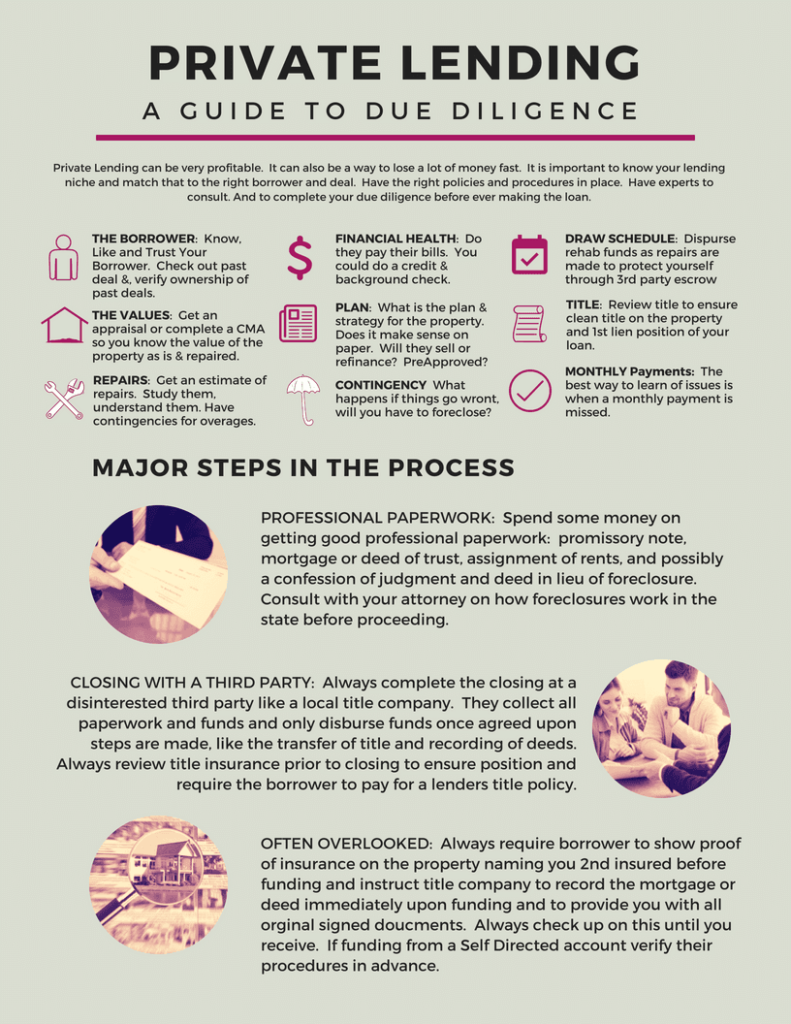When it comes to providing loans, hard money lenders face the crucial task of verifying the property’s title. Ensuring the authenticity and legal ownership of a property is essential to safeguard their investments. By leveraging a combination of meticulous documentation review, title searches, and professional guidance, hard money lenders effectively verify the property’s title to mitigate potential risks and ensure a secure lending process.

1. Overview of Hard Money Lenders
Hard money lenders are individuals or institutions that provide short-term loans secured by real estate. Unlike traditional lenders such as banks, hard money lenders focus more on the value of the property itself rather than the borrower’s creditworthiness. They are usually involved in financing real estate investments, such as fix-and-flip projects or land acquisitions, where the borrower needs quick access to funds.
1.1 Definition and Purpose of Hard Money Loans
A hard money loan is a type of loan that is backed by the value of a property. The loan is typically short-term, usually ranging from a few months to a few years. The purpose of a hard money loan is to provide fast financing for real estate investments where traditional financing may not be feasible due to various reasons such as the property’s condition, the borrower’s credit history, or the urgency of the investment.
Unlike traditional loans, hard money loans are typically funded by private investors or groups rather than banks or other financial institutions. This allows for more flexibility in terms of loan terms, repayment schedules, and eligibility criteria.
1.2 Role of Hard Money Lenders
Hard money lenders play a crucial role in the real estate industry by providing quick and accessible financing options for investors. Their primary role is to evaluate the value and potential of the property being used as collateral for the loan. They assess the property’s condition, location, market trends, and the borrower’s plans for the property.
Hard money lenders also evaluate the borrower’s ability to repay the loan, although creditworthiness is of lesser importance compared to traditional lenders. They focus more on the value of the property and the potential return on investment for both the borrower and the lender.
2. Importance of Verifying the Property’s Title
Verifying the property’s title is a critical step for hard money lenders to ensure the security of their investment. Proper title verification helps identify any potential issues or liabilities associated with the property’s ownership. It ensures that the property is free from any conflicting claims, liens, or encumbrances that could jeopardize the hard money loan.
2.1 Ensuring Clear Ownership
The first aspect of title verification involves confirming clear ownership of the property. Hard money lenders need to ensure that the borrower has legal and undisputed ownership rights to the property. This is crucial to protect both the lender’s investment and the borrower’s interests.
By verifying clear ownership, hard money lenders can avoid potential legal disputes related to property rights or competing claims that may arise during or after the loan period. Clear ownership provides a sense of security for both the lender and the borrower, ensuring a smoother transaction.
2.2 Identifying Liens and Encumbrances
Another important aspect of title verification is identifying any outstanding liens or encumbrances on the property. Liens can be placed on a property as a result of unpaid taxes, mortgages, or legal judgments against the property owner. Encumbrances, on the other hand, refer to any legal restrictions on the property’s use or transfer, such as easements or zoning regulations.
Identifying these liens and encumbrances is crucial for hard money lenders as they directly impact the property’s value and the lender’s ability to recover their investment in the event of default by the borrower. By identifying and addressing these issues upfront, hard money lenders can mitigate potential risks and ensure a smooth loan process.
3. Initial Steps in Title Verification
To initiate the title verification process, hard money lenders typically follow a systematic approach that involves obtaining a preliminary title report and reviewing ownership information.
3.1 Obtaining a Preliminary Title Report
The first step in title verification is obtaining a preliminary title report. This report provides valuable information about the property’s ownership, any existing liens or encumbrances, and other relevant details. It is prepared by a title company or a title agency and serves as a starting point for the detailed title search and examination.
The preliminary title report includes a legal description of the property, the name of the current owner, and any recorded liens or encumbrances. By reviewing this report, hard money lenders can get an initial understanding of the property’s title status and identify any potential issues that may require further investigation.
3.2 Reviewing Ownership Information
In addition to the preliminary title report, hard money lenders also review ownership information to ensure the borrower’s legitimate ownership of the property. This includes reviewing documents such as deeds, contracts, or conveyances that establish the chain of ownership.
By reviewing ownership information, hard money lenders can verify that the borrower has the legal right to use the property as collateral for the loan. It helps establish the borrower’s credibility and protects the lender from potential fraud or misrepresentation.
4. Professional Title Search and Examination
Once the initial steps are completed, hard money lenders proceed with a professional title search and examination process. This involves engaging a title company or a title attorney to conduct a thorough investigation into the property’s title history.
4.1 Engaging a Title Company
Hard money lenders typically engage a reputable title company to perform the title search and examination. Title companies are experienced in conducting comprehensive investigations and provide professional expertise to ensure a thorough verification process.
By engaging a title company, hard money lenders can leverage their knowledge and expertise in verifying property titles. It also demonstrates the lender’s commitment to a rigorous due diligence process, which adds credibility to the loan transaction.
4.2 Thorough Title Search Process
The title search process involves examining public records and other relevant documentation to trace the ownership history of the property. This includes searching for deeds, mortgages, tax records, court filings, and other recorded documents that may affect the property’s title.
During the title search, the title company will investigate any potential issues such as unresolved liens, unclear ownership transfers, or undisclosed encumbrances. This process helps identify any potential risks or defects in the property’s title that need to be resolved before finalizing the loan.

5. Investigating Liens and Encumbrances
One of the key objectives of title verification is to investigate and address any existing liens or encumbrances on the property. This helps ensure that the property can be transferred to the borrower without any legal complications.
5.1 Examining Recorded Documents
During the title search process, the title company examines recorded documents to identify any outstanding liens or encumbrances. This includes reviewing mortgage records, tax assessments, mechanics’ liens, or any other recorded claims against the property.
By examining recorded documents, hard money lenders can assess the priority and validity of existing liens. This is crucial in determining the value of the property and understanding potential challenges that may arise during the loan repayment process.
5.2 Searching for Unrecorded Liens
In addition to recorded liens, hard money lenders also need to be aware of any unrecorded liens that may exist on the property. Unrecorded liens refer to claims or debts that are not officially documented in public records but still hold legal significance.
To identify unrecorded liens, the title company may conduct interviews with relevant parties, such as contractors, suppliers, or previous property owners. This helps ensure that there are no hidden liabilities that could impact the property’s title or the repayment of the loan.
6. Clearing Issues and Obtaining Title Insurance
Once the title search reveals any issues or defects in the property’s title, it is essential to address and resolve them. Clearing these issues helps ensure a marketable and insurable title for the property, making it more attractive to both the lender and potential buyers.
6.1 Addressing Title Defects
Title defects can arise from various sources, such as errors in public records, forged documents, missing signatures, or undisclosed heirs. Hard money lenders work closely with the title company and the borrower to rectify these defects and ensure a clear and marketable title.
Common methods of addressing title defects include obtaining corrective deeds, curing minor encumbrances, or resolving legal disputes through court proceedings. By addressing these issues, hard money lenders safeguard their investment and minimize the potential risks associated with a defective title.
6.2 Securing Title Insurance
Title insurance is a crucial component of the title verification process for hard money lenders. It protects lenders and borrowers from potential losses or expenses arising from undiscovered liens, defects, or other title-related issues.
Title insurance is typically obtained after the title search and examination process is completed, and any issues are resolved. It provides financial protection in the event of a future challenge to the property’s title, allowing the lender to recover their investment and the borrower to retain ownership.
:max_bytes(150000):strip_icc()/terms_h_hard_money_loan-FINAL-b9af7690939e45d5a80e25ee55c83d40.jpg)
7. Ensuring Validity of Title Transfers
In addition to verifying clear ownership, hard money lenders need to ensure the validity of title transfers associated with the property. This involves reviewing deeds and conveyances to confirm the legitimacy and accuracy of previous ownership transfers.
7.1 Reviewing Deeds and Conveyances
Deeds and conveyances are legal documents that show the transfer of ownership rights from one party to another. Hard money lenders review these documents to ensure that all previous transfers were properly executed, recorded, and authorized.
By reviewing deeds and conveyances, hard money lenders can validate the chain of title and identify any irregularities or disputes related to the property’s ownership history. It provides a comprehensive understanding of the property’s legal status and minimizes the risk of investing in a property with questionable ownership.
7.2 Confirming Proper Chain of Title
Confirming the proper chain of title is crucial for hard money lenders to ensure that all previous transfers were legitimate and in compliance with applicable laws and regulations. It helps establish the borrower’s rightful ownership and protects the lender’s investment from potential legal challenges.
By confirming the proper chain of title, hard money lenders can gain confidence in the property’s marketability and reduce the risk of future disputes or claims against the property’s ownership. It is an important step to ensure a smooth loan transaction and protect the interests of all parties involved.
8. Considering Legal Opinions and Judgments
In some cases, hard money lenders may consider seeking legal opinions or evaluating past judgments and lawsuits related to the property. This helps assess any legal risks or obligations that may impact the property’s title or the repayment of the loan.
8.1 Evaluating Legal Opinions
Legal opinions are formal assessments provided by qualified attorneys regarding specific legal matters related to the property. Hard money lenders may request legal opinions to address complex issues, such as zoning regulations, easements, or potential legal challenges affecting the property.
By evaluating legal opinions, hard money lenders can gain a comprehensive understanding of the legal implications associated with the property. It helps identify potential risks and allows lenders to make informed decisions based on expert legal advice.
8.2 Analyzing Judgments and Lawsuits
Analyzing past judgments and lawsuits related to the property helps hard money lenders assess any potential claims or pending litigation that may affect the property’s title. By reviewing court records and legal proceedings, lenders can evaluate the impact of these judgments on the property’s marketability and the borrower’s ability to repay the loan.
Analyzing judgments and lawsuits provides valuable insights into the property’s legal history and potential risks involved. It allows hard money lenders to make informed decisions and implement mitigation strategies to protect their investment.

9. Utilizing Online Resources for Verification
In today’s digital era, hard money lenders can leverage online resources to streamline the title verification process. Online public records databases and historical data sources offer convenient access to a wealth of information that can aid in the verification of a property’s title.
9.1 Accessing Public Records Databases
Online public records databases provide a centralized platform for accessing various records related to property ownership, liens, mortgages, and legal proceedings. These databases offer a convenient and efficient way to gather information, saving time and effort in the title verification process.
By accessing public records databases, hard money lenders can quickly retrieve vital documents and identify potential issues associated with the property’s title. It enhances the efficiency and accuracy of the verification process, allowing lenders to make informed decisions based on reliable information.
9.2 Researching Historical Data
Historical data sources, such as archived newspapers, property records, or historical maps, can provide valuable insights into the property’s past and aid in verifying its title. Hard money lenders can research historical data to trace the property’s ownership history, uncover any historical events or disputes, and assess the property’s long-term value.
Researching historical data adds depth to the title verification process, offering a broader understanding of the property’s background and potential risks. It allows hard money lenders to make informed decisions based on a comprehensive analysis of the property’s historical context.
10. Finalizing the Title Verification Process
Once all necessary steps and investigations are completed, hard money lenders move towards finalizing the title verification process. This involves documentation and collaboration with the borrower and other title professionals.
10.1 Documentation and Closing Process
To finalize the title verification process, hard money lenders prepare the necessary documentation, including the loan agreement, promissory note, and deed of trust. These documents outline the terms of the loan, the repayment schedule, and the collateral securing the loan.
Collaboration with the borrower is crucial during this stage to ensure that all legal obligations are met and that there is a clear understanding of the loan terms and conditions. Hard money lenders work closely with borrowers to address any concerns or questions, facilitating a smooth closing process.
10.2 Collaboration with Borrower and Title Professionals
Throughout the entire title verification process, hard money lenders collaborate closely with borrowers and title professionals to ensure a comprehensive and accurate assessment of the property’s title. Open communication and collaboration between all parties involved help mitigate risks and address any issues that may arise.
Hard money lenders rely on the expertise and guidance of title professionals to navigate the complex legal aspects of title verification. By working together, lenders, borrowers, and title professionals can ensure a successful and secure transaction that protects the interests of all parties involved.
In conclusion, verifying the property’s title plays a crucial role in the lending process for hard money lenders. Comprehensive title verification helps identify any potential issues or liabilities associated with the property’s ownership, ensuring a secure and marketable title for the borrower and protecting the lender’s investment. By following a systematic approach, engaging professional title companies, and utilizing online resources, hard money lenders can mitigate risks, ensure a smooth loan process, and make informed lending decisions.




